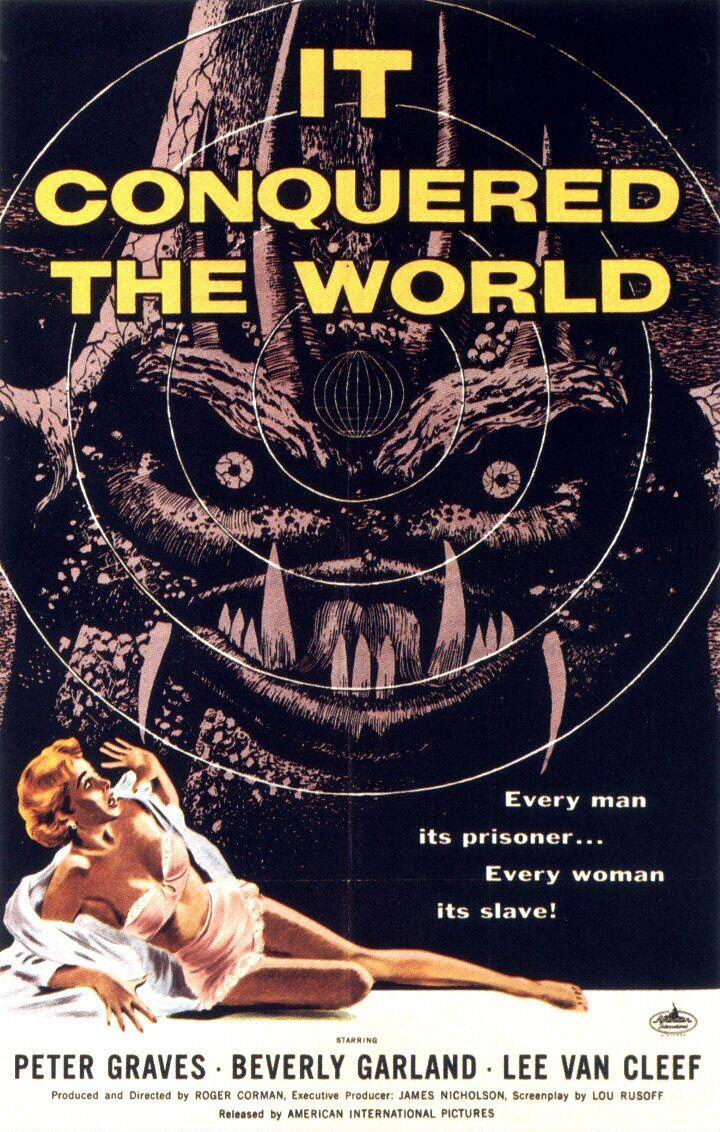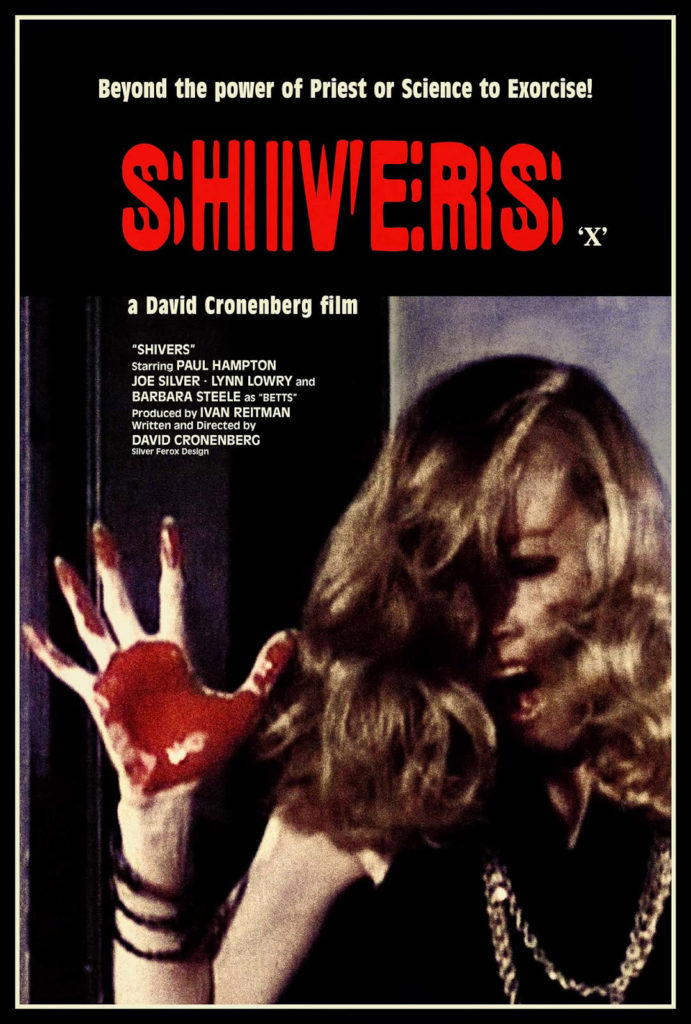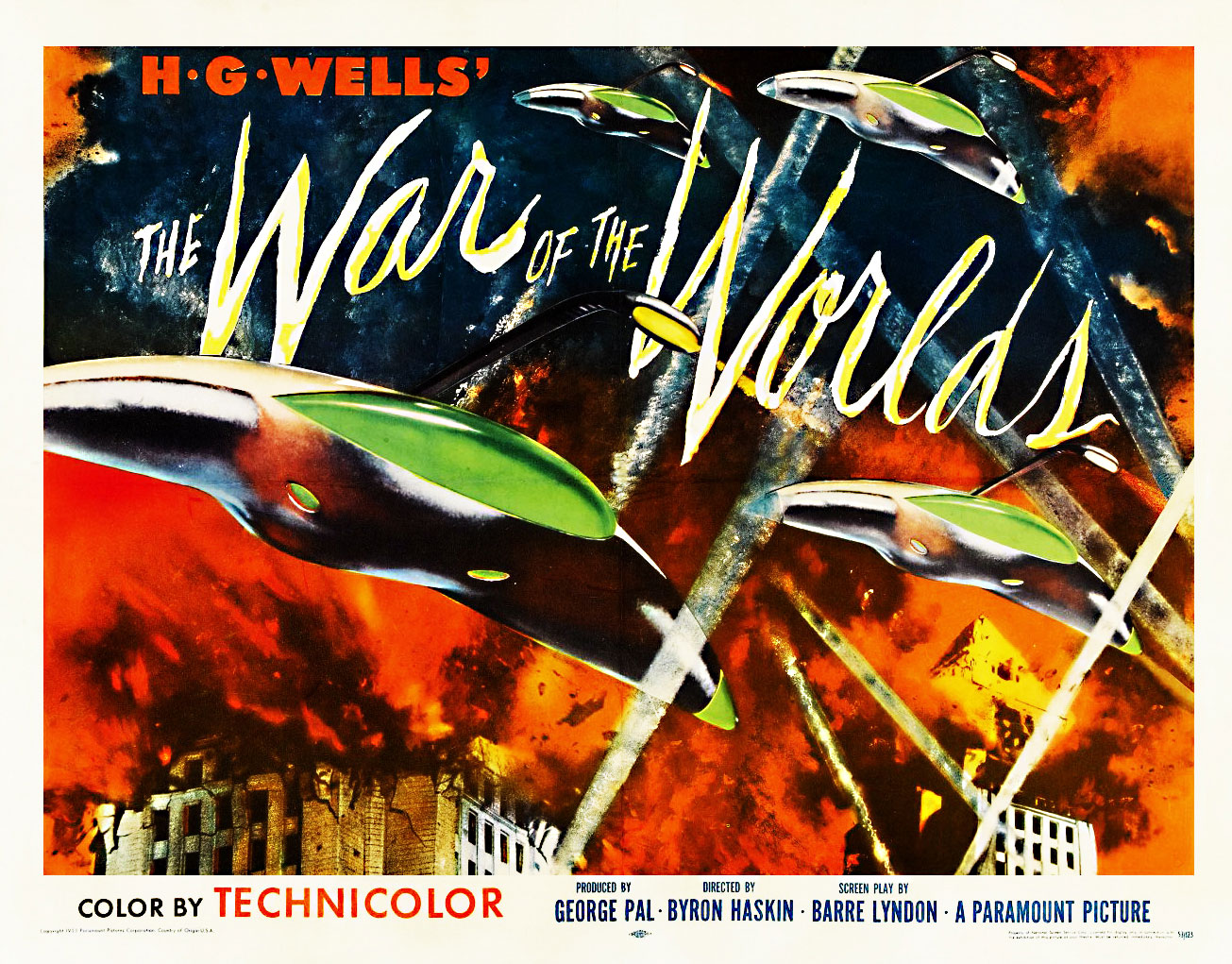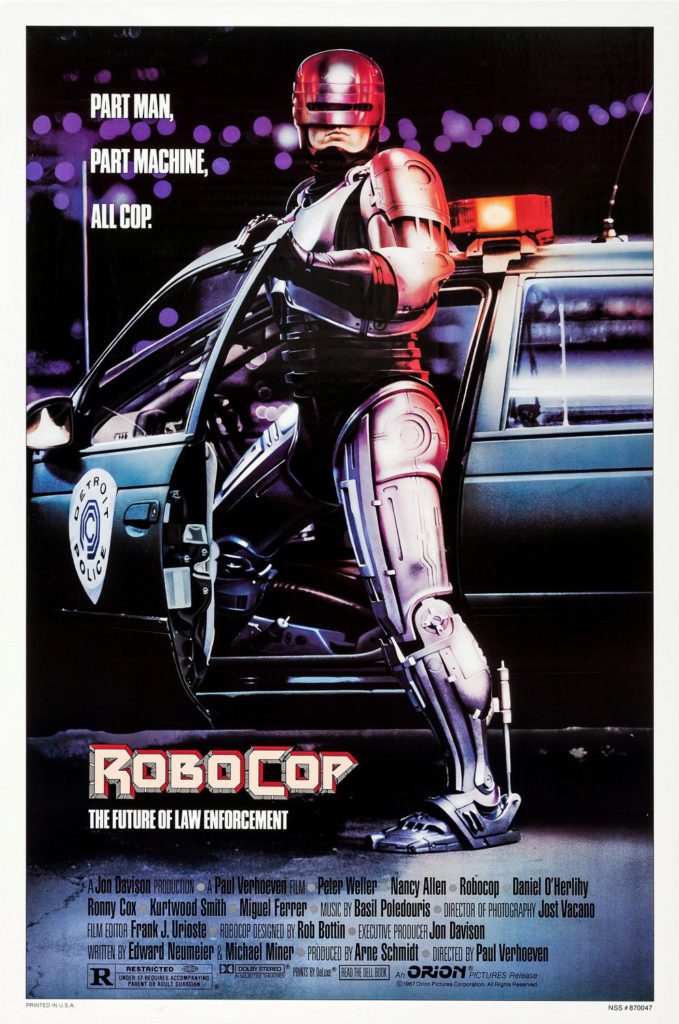Before there was Splatter Farm, there was Hallucinations, a movie the Polonia brothers and Todd Michael Smith shot on video in 1986. It wasn’t released until 2007, as an extra on another Polonia flick. It is very much the product of a trio of teenagers exploring their love of horror and trash cinema, and working out their nascent artistic chops. Offering a detailed critique of this movie makes little sense. It doesn’t exist in the same realm as art films or Hollywood. It’s a movie made by young adults who were too young to vote, yet it also displays a surprising grasp of editing and pace. That’s quite the feat considering the movie has an incomprehensible plot. Like Splatter Farm, it also has scenes many mainstream horror flicks would avoid. Continue reading “It Came from the Camcorder: Hallucinations and Lethal Nightmare”
Tag: A Flick That’s Not Really About the Thing It’s About
It Came from the ’50s: It Conquered the World
 Roger Corman was a better director than Bert I. Gordon. That’s obvious, of course. Roger Corman is a Hollywood legend, while Gordon is known only to us poor souls who like trash cinema. Corman’s reputation has been burnished by all the successful filmmakers that came through his stable, but he could trash it up with the worst of them. I mention Corman and Gordon in the same breath because today’s It Came from the 1950s entry is almost indistinguishable from the crap Gordon used to turn out. The only major difference is that Corman knew how to end a scene before things got too boring.
Roger Corman was a better director than Bert I. Gordon. That’s obvious, of course. Roger Corman is a Hollywood legend, while Gordon is known only to us poor souls who like trash cinema. Corman’s reputation has been burnished by all the successful filmmakers that came through his stable, but he could trash it up with the worst of them. I mention Corman and Gordon in the same breath because today’s It Came from the 1950s entry is almost indistinguishable from the crap Gordon used to turn out. The only major difference is that Corman knew how to end a scene before things got too boring.
It Conquered the World was released in 1956, and was directed and produced by Corman from a screenplay by Lou Rusoff, who penned the execrable Phantom from 10,000 Leagues. This flick is miles better than Phantom, and it still stinks.
It stars Peter Graves as Dr. Paul Nelson, who works on a project launching America’s first satellites into orbit. One of his friends is Dr. Tom Anderson (Lee Van Cleef), a scientist disillusioned with the state of mankind. How fortunate for Dr. Anderson that he finds a friend in an alien being from Venus, one of the last of his race. The alien communicates with Anderson through a radio set in Anderson’s house. The alien is giving Anderson instructions to help pave the way for a Venusian takeover of Earth. Continue reading “It Came from the ’50s: It Conquered the World”
It Came from the ’50s: Invasion of the Body Snatchers (1956)
Regular readers know that we here at Missile Test love us some schlock. Especially the ’50s kind, with its cheap sets, hammy actors, ridiculous monsters, and short ties. At first glance, 1956’s Invasion of the Body Snatchers would fit right in. But, this flick ain’t schlock. Oh, no.
Directed by Don Siegel (who directed some excellent movies — including Dirty Harry), from a screenplay by Daniel Mainwaring, adapting Jack Finney’s novel, Body Snatchers tells the tale of a small town in California whose residents are being replaced by impostors. Continue reading “It Came from the ’50s: Invasion of the Body Snatchers (1956)”
October Horrorshow: The Cured
Should a filmmaker decide to make a zombie flick these days, they will have to contend with oversaturation and viewer weariness. The 21st century has been awash with zombie flicks. And should film not sate one’s desires to see the undead tear apart human flesh, there is the media juggernaut that is The Walking Dead, still lumbering along after fifteen years. That franchise has done more to make people tired of zombies than anything else. The degree of difficulty for a filmmaker to make something interesting in the zombie subgenre of horror, then, is very high. There are basically two options. One: come up with a new idea that shakes up the unwritten rules of zombies. Two: go conventional, but do it well. Both of those are easier said than done. The Cured, the 2017 zombie flick from writer/director David Freyne, tries to do a combination of both. Continue reading “October Horrorshow: The Cured”
Stallone Month: Rocky IV
This film is, without a doubt, peak Rocky. Gone is the working class Joe with the wicked left. In his place is a warrior for not just the American way, but for the Reagan era. It’s a stunning character transition, and also makes for spectacle of the highest order. Just sit back and say “wow” whenever it feels appropriate. But first, viewers must endure Paulie’s birthday party scene. Continue reading “Stallone Month: Rocky IV”
October Horrorshow: Shivers
 Has David Cronenberg ever made a movie that wasn’t about sex? On some level, probably not. There’s also nothing wrong with that, despite the prudish direction the moral majority has taken the United States in the last 35 years or so. Good thing for us that Cronenberg is a Canadian, right?
Has David Cronenberg ever made a movie that wasn’t about sex? On some level, probably not. There’s also nothing wrong with that, despite the prudish direction the moral majority has taken the United States in the last 35 years or so. Good thing for us that Cronenberg is a Canadian, right?
Shivers, from 1975, is Cronenberg’s first feature film, and it is all about sex. It’s not a fetish exploration like his later film, Crash, but sex is a central theme. In Shivers, a well-meaning but certifiably insane doctor named Hobbes (Fred Doederlein) has infected a resident of a new residential tower in Montreal with a parasite. The mad doctor told his financial backers and research partners that he was developing a new method to regrow organs, when in fact his true purpose was to return man to an animalistic state, a state where life would be one endless orgy. But, he screwed up, and the film opens with him trying to destroy the teenager whom he infected with the parasite. In the opening scenes, we see the doctor kill the girl and then himself, in a brutal but well done little introduction to the film that juxtaposes the modern living aspects of the apartment building with the brutal horror hidden within its walls. Even in his first film, Cronenberg starts off by showing he understands pace and storytelling. Continue reading “October Horrorshow: Shivers”
October Horrorshow: The War of the Worlds (1953)
 Monsters, devil worshippers, demons, ghosts, sadomasochistic inter-dimensional travelers...it can get to be too much. It’s time for the Horrorshow to take a step back from all the gore and scary stuff and spend some time with some nice, wholesome alien invaders.
Monsters, devil worshippers, demons, ghosts, sadomasochistic inter-dimensional travelers...it can get to be too much. It’s time for the Horrorshow to take a step back from all the gore and scary stuff and spend some time with some nice, wholesome alien invaders.
From 1953 and adapted from the famous HG Wells story, The War of the Worlds is not the first alien invasion flick, but it is prototypical. A mass surprise invasion by alien beings in possession of unstoppable destructive power threatens to overwhelm the world. The situation is dire, the entire world mere days or hours from being conquered. But, against the odds, and due to providence, luck, good old-fashioned American ingenuity, or a thorough lack of understanding of the laws of nature on the part of the aliens and the screenwriters, the invaders are vanquished. And I mean vanquished. No alien invaders ever just get beat, or end up slogging into insurgency warfare (with the notable exceptions of V and Falling Skies, but that’s on TV). Aliens in these flicks get wiped out, in total, usually in a matter of minutes. The denouement in these films, The War of the Worlds included, can feel a bit rushed. But that doesn’t mean it doesn’t work. Continue reading “October Horrorshow: The War of the Worlds (1953)”
The Empty Balcony: Gojira & Godzilla, King of the Monsters!
Gojira is a very serious film. To watch it is to glimpse how grievously Japan was traumatized by World War II. Released only nine years after the end of the war, the film is heavy on imagery meant to invoke memories of the destruction that swept Japan’s cities. The origins of the monster Gojira are a pricking of the wounds left over from the nuclear bombings of Hiroshima and Nagasaki, and the firebomings that destroyed almost all large Japanese cities. What we see in this film is a generation of people still trying to cope with events from a decade past. At times, in scenes that take place in overflowing hospital wards or on streets where characters are surveying the devastation, I was struck by the realization that these people on screen were drawing from their own memories in their portrayals. Continue reading “The Empty Balcony: Gojira & Godzilla, King of the Monsters!”
October Horrorshow: 1408
For about half the film, Mikael Håfström’s 1408, based on the Stephen King short story of the same name, is creepy and frightening. By then, the viewer has grown used to Mike Enslin’s (John Cusack) predicament, and the film has no other alternative than to fall into convention. That’s unfortunate, because if Håfström had been able to sustain the atmosphere of the first half throughout the film, it would rank among the best ghost films of all time. A lot can be said for a film with potential like that. Continue reading “October Horrorshow: 1408″
The Empty Balcony: Robocop (1987)
 Dystopian future societies are the stuff dreams are made of. They are what grow from the seeds of our own decadence and shallowness. The moral bankruptcy, and sometimes outright horror, of the settings of films like Blade Runner, A Clockwork Orange, THX 1138, Escape from New York, and Soylent Green wouldn’t be possible if writers and directors didn’t look around them and see the lightning speed with which we throw ourselves into unknown futures, sometimes without regard for so many of the present realities which work so well and don’t need change. The ever-present message is that change, sometimes jarring change, is inevitable. Films that look to the future warily revolve around placing the viewer in the role of Rip Van Winkle. When the theater lights dim, the familiar world of today dissolves into the freak show of tomorrow. The overriding questions always being: Why are the people onscreen comfortable with this? Why doesn’t everybody see how wrong things are?
Dystopian future societies are the stuff dreams are made of. They are what grow from the seeds of our own decadence and shallowness. The moral bankruptcy, and sometimes outright horror, of the settings of films like Blade Runner, A Clockwork Orange, THX 1138, Escape from New York, and Soylent Green wouldn’t be possible if writers and directors didn’t look around them and see the lightning speed with which we throw ourselves into unknown futures, sometimes without regard for so many of the present realities which work so well and don’t need change. The ever-present message is that change, sometimes jarring change, is inevitable. Films that look to the future warily revolve around placing the viewer in the role of Rip Van Winkle. When the theater lights dim, the familiar world of today dissolves into the freak show of tomorrow. The overriding questions always being: Why are the people onscreen comfortable with this? Why doesn’t everybody see how wrong things are?
Simply put, because that’s how things in the future work. People in the future grow up among the bizarre, things we wouldn’t recognize, as though these were the normal conditions of existence, rather than a manufactured reality that mankind has created for itself. The irony is, of course, that we, in real life, away from the fantasies of Hollywood, live like these silver screen wraiths, embracing the fast pace of technological advance, throwing off the yoke of millennia of human history to embrace the dictates of the electronic age. Implicit in films that depict the future is that civilizational advance is a given, destroying the ways and mores of the past, creating something unrecognizable to those who weren’t witness. This resonates because that is exactly how our ancestors would feel would they awake in today’s world. Continue reading “The Empty Balcony: Robocop (1987)”
